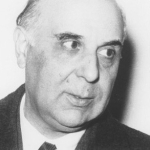Teucer: . . . in sea-girt Cyprus, where it was decreed
by Apollow that I should live, giving the city
the name of Salamis in memory of my island home.
. . . . . . . . . .
Helen: I never went to Troy; it was a phantom.
. . . . . . . . . .
Servant: What? You mean it was only for a cloud
that we struggled so much?
— Euripides, Helen
‘The nightingales won’t let you sleep in Platres.’
Shy nightingale, in the breathing of the leaves,
you who bestow the forest’s musical coolness
on the sundered bodies, on the souls
of those who know they will not return.
Blind voice, you who grope in the darkness of memory
for footsteps and gestures — I wouldn’t dare say kisses —
and the bitter raving of the frenzied slave-woman.
‘The nightingales won’t let you sleep in Platres.’
Platres: where is Platres? And this island: who knows it?
I’ve lived my life hearing names I’ve never heard before:
new countries, new idiocies of men
or of the gods;
my fate, which wavers
between the last sword of some Ajax
and another Salamis,
brought me here, to this shore.
The moon
covered the Archer’s stars, now moves to find
the heart of Scorpio, and alters everything.
truth, where’s the truth?
I too was an archer in the war;
my fate: that of a man who missed his target.
Lyric nightingale,
on a night like this, by the shore of Proteus,
the Spartan slave-girls heard you and began their lament,
and among them — who would have believed it? — Helen!
She whom we hunted so many years by the banks of the Scamander.
She was there, at the desert’s lip; I touched her; she spoke to me:
‘It isn’t true, it isn’t true,’ she cried.
‘I didn’t board the blue bowed ship.
I never went to valiant Troy.’
shadows and smiles everywhere,
on shoulders, thighs and knees;
the skin alive, and her eyes
with the large eyelids,
she was there, on the banks of a Delta.
And at Troy?
At Troy, nothing: just a phantom image.
That’s how the gods wanted it.
And paris, Paris lay with a shadow as though it were a solid being;
and for ten whole years we slaughtered ourselves for Helen.
Great suffering had desolated Greece.
So many bodies thrown
into the jaws of the sea, the jaws of the earth
so many souls
fed to the millstones like grain.
And the rivers swelling, blood in their silt,
all for a linen undulation, a filmy cloud,
a butterfly’s flicker, a wisp of swan’s down,
an empty tunic — all for a Helen.
And my brother?
Nightingale nightingale nightingale,
what is a god? What is not a god? And what is there in between them?
‘The nightingales won’t let you sleep in Platres.’
Tearful bird,
on sea-kissed Cyprus
consecrated to remind me of my country,
I moored alone with this fable,
if it’s true that it is a fable,
if it’s true that mortals will not again take up
the old deceit of the gods;
if it’s true
that in future years some other Teucer,
or some Ajax or Priam or Hecuba,
or someone unknown and nameless who nevertheless saw
a Scamander overflow with corpses,
isn’t fated to hear
messengers coming to tell him
that so much suffering, so much life,
went into the abyss
all for an empty tunic, all for a Helen.

















Comment form: